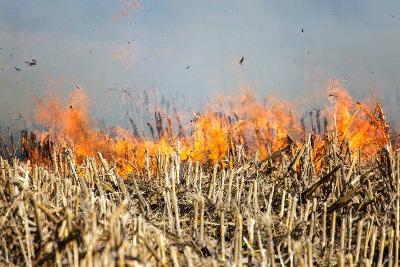Wildfires and heatwaves

In 2022, Norfolk witnessed the devastating impact of extreme heat and wildfires. Twenty homes were destroyed, and the countryside, much-loved natural landscapes and wildlife were harmed.
Norfolk Fire and Rescue Service is well-equipped to deal with the challenges of fire. However, we can all help to reduce the devastating impact of wildfires, while enjoying our environment.
During a heatwave be considerate
- Do not drop cigarettes or any burning item onto dry ground
- Ensure cigarettes are fully extinguished when smoking outside. Do not throw them from car windows where they may land on dry ground or grass by the roadside
- Do not leave glass products behind when enjoying time outside. Direct sunlight through glass can cause a fire risk
- Do not use barbecues in fields, open grassland, parks and forests
- Ensure portable barbecues are fully extinguished and cold before safe disposal
- Be aware of using barbecues, fire pits or bonfires around thatched properties. It only takes one spark, ash or embers moved by wind to cause accidental fire
- Avoid driving on long, dry grass and fields. Your vehicle's exhaust can reach more than 1000 degrees. If you must drive in grassy areas, do not leave your engine running when parked. Remain vigilant
How to protect your home
Embers and wind movement of fire tend to be the cause of most wildfires, particularly those reaching property in rural areas. Embers can travel when driven by windy conditions which can cause spot fires further away. Wildfires have sadly been witnessed by many Norfolk residents.
One of the most important actions you can take to protect your home, belongings and family is to ensure you have suitable and adequate home insurance.
Prepare for the risk of wildfire
- Have an escape plan for your safety in the event of a wildfire. Make sure your family know what to do and where to assemble. Think about care for pets and domestic animals
- Discuss this escape plan with near neighbours or your local community
- Make sure your property is clearly marked. A house number or name should be clearly visible from the road or main access point. This helps us to easily locate your address in the event of a fire
- If you have decking, try not to use the area underneath for storage and remove any combustible materials or debris regularly. Where possible, keep storage of furniture to a minimum
- Check your fences and make sure there are no gaps between overlapping panels or between you and a neighbour's fence. Debris and embers could build up in these gaps causing a fire
- Consider replacing wooden, plastic or other combustible material fencing or gates with metal. This will help to reduce a fire spread
- Keep your driveway, paths, gardens, patios and decking free from rubbish and debris to reduce combustible sources
- Keep trees on your property trimmed back and away from the house. Do not allow branches to overhang into gutters or towards the roof
- Be aware of weather reports, especially during extreme conditions. Avoid using barbeques or lighting bonfires in the garden to reduce the risk
- Think about home fire safety and ensure you have working smoke alarms on each level of your home. Test them regularly and make an escape plan. Know what to do in the event of an emergency
- Consider storing important documents. Paperwork such as wills, birth certificates and precious photographs can be stored in a fireproof safe or box
- Evacuating your home may be your safest option in an emergency. Having your family's essential items helps when it really matters. Consider valuables, medication, mobile phones, chargers, money, clothing, food and do not forget your pets. It is worth photographing important documents, passports, and recording important phone numbers. Keep these essential items handy and make sure everyone knows where they are
- Consider always reverse parking your vehicle into your driveway. This will allow for easy departure
If you are outside and witness wildfire
- Stay calm
- Find a safe location away from vegetation and smoke
- If you are in driving, close all windows and vents
- Call 999 and inform us of your location. You could use a locator app such as Ordnance Survey or What3Words to help if you are unsure
If you are at home and witness a wildfire
- Stay calm, find a place of safety, be prepared to evacuate and do not attempt to extinguish the fire yourself
- Keep doors and windows closed, but please do not lock them
- Call 999 immediately. Share your full address or make use of What3Words to help you
- Let us know the best access point to get to the property. If safe to do so, stand by the access point and speak to emergency services on arrival
In the event of any fire, or if you witness a smouldering fire, please do not hesitate to call 999.
We can react quickly, bringing the fire under control and reducing the potential for that fire to spread further. The sooner we can respond means the right resources are mobilised. This keeps our service ready to act on all emergency calls.
